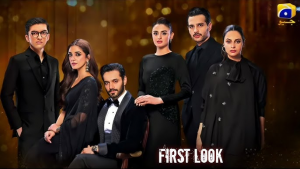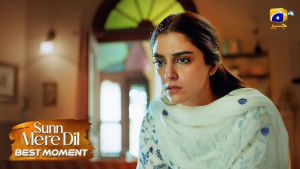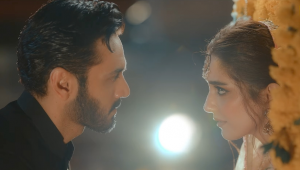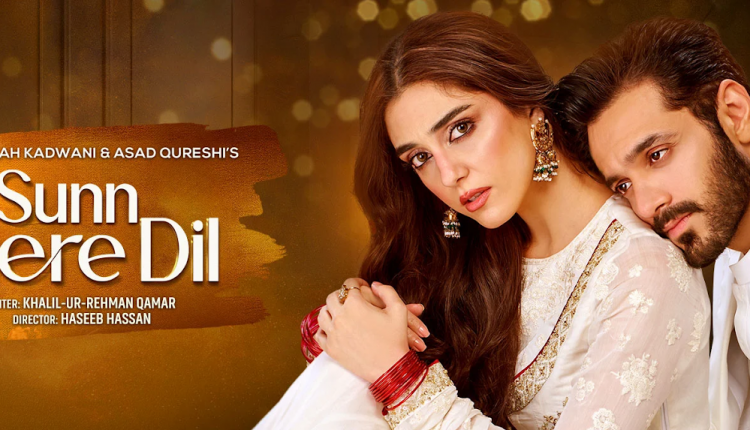Sunn Mere Dil: The Masterclass in How Not to Write a Drama
"Sunn Mere Dil" brings you drama, tears, and a chaotic wedding that redefines the meaning of over-the-top television.
Every once in a while, a drama comes along that unites audiences—not in admiration, but in collective disbelief. Sunn Mere Dil, airing on Geo TV, is exactly that drama. Penned by the ever-controversial Khalil-ur-Rehman Qamar (KRQ), this show somehow manages to be both spectacularly exaggerated and mind-numbingly dull at the same time. With a plot riddled with inconsistencies, characters who seem to be competing for the “Most Irritating Personality” award, and dialogues that belong on an unhinged WhatsApp group, this drama is a crash course in how not to do storytelling. Let’s dive into this delightful disaster.
A Recipe for Disaster
At the heart of Sunn Mere Dil is Bilal Abdullah (Wahaj Ali), a perpetually drunk CEO whose primary hobbies include staring moodily into space and sipping whiskey like it’s a personality trait. Bilal is the supposed “hero” of this saga—a misunderstood man battling inner demons. Except, instead of rooting for him, you’ll probably find yourself rooting for his liver to survive the alcohol abuse.
Opposite Bilal is Sadaf (Maya Ali), a woman so passive she makes a houseplant look assertive. Her entire existence revolves around pining for Bilal and enduring every hardship imaginable. If you’re looking for a strong female lead, look elsewhere—Sadaf’s main skill set is crying prettily while being rescued by Bilal, whose savior complex is as grating as his drinking problem.
But wait! There’s more. Enter Hamsha (Hira Mani), the manipulative villainess with a flair for drama and destruction. Hamsha is the kind of character who would push someone off a cliff and then blame gravity. If chaos had a spokesperson, it would be her. Throw in Sarah (Amar Khan), the bland best friend, and Rehan (Usama Khan), the world’s most desperate simp, and you have a cast that’s less “ensemble” and more “circus.”

A Drunken CEO and His Desperate Love Interest
Let’s talk about Bilal. Imagine Devdas, but instead of a tragic, poetic hero, you get a sulking man-child whose main contribution to the plot is being drunk yet somehow morally superior. KRQ clearly wants us to see Bilal as a flawed yet redeemable man, but the execution is so off that he comes across as a walking red flag. In real life, Bilal would be the guy you avoid at office parties because he’s too busy philosophizing over his drink.
Wahaj Ali, who has delivered stellar performances in the past, is clearly struggling to make sense of this character. And who can blame him? Bilal’s personality swings between brooding intensity and drunken apathy, leaving no room for nuance. The result is a hero who is neither likable nor relatable.

The Queen of Tears
Next up is Sadaf, played by Maya Ali. Poor Sadaf. She’s not so much a character as she is a collection of every regressive trope KRQ could think of. Helpless? Check. Perpetually crying? Double check. Defined solely by her relationship with a man? Triple check.
Maya Ali, a talented actress in her own right, does what she can with this thankless role. But no amount of good acting can save a character whose primary purpose is to exist as Bilal’s emotional punching bag. It’s 2024, and yet here we are, watching a female lead whose idea of empowerment is waiting for a drunk CEO to fix his life.

Chaos Personified
If there’s one character who adds spice to this otherwise bland stew, it’s Hamsha. Played by Hira Mani, Hamsha is the show’s villain, manipulator, and resident drama queen. She’s the kind of person who would set a building on fire just to roast marshmallows over the flames.
While Hamsha’s antics are often laughably over-the-top, there’s no denying that Hira Mani brings a certain zest to the role. You might not like Hamsha, but at least she’s doing something—unlike Sadaf, who spends most of her time staring wistfully into the distance.
The Forgotten Sidekick
And then there’s Sarah, played by Amar Khan. Poor Sarah is the drama’s equivalent of a background prop. She exists to deliver the occasional pep talk to Sadaf and fill in awkward silences with generic motivational quotes. Despite Amar Khan’s best efforts, Sarah remains a painfully underdeveloped character who adds little to the overall story.
Simping to New Heights
Rehan, portrayed by Usama Khan, takes the concept of unrequited love and stretches it to absurd extremes. His obsessive devotion to Sadaf is supposed to be endearing, but it’s really just uncomfortable. Rehan’s character is a cautionary tale for anyone thinking of making grand romantic gestures—don’t do it unless the other person is actually interested. Usama Khan tries his best to inject some life into Rehan, but the writing gives him little to work with.
Khalil-ur-Rehman Qamar: The Man, The Myth, The Misogyny
No discussion of Sunn Mere Dil is complete without addressing the elephant in the room: Khalil-ur-Rehman Qamar’s writing. KRQ has built a career on crafting dramas that are equal parts controversial and regressive, and this show is no exception. His portrayal of women as either saintly victims or scheming villains is as outdated as a dial-up modem. Meanwhile, his male characters are glorified despite their glaring flaws—because, in KRQ’s world, masculinity trumps morality.
The dialogues in Sunn Mere Dil are particularly painful. KRQ’s trademark monologues are present and accounted for, but instead of being profound, they come across as preachy and self-indulgent. Add in the show’s problematic themes—alcoholism as a quirky trait, toxic masculinity as heroism, and emotional manipulation as romance—and you’ve got a script that’s more red flags than substance.
Drowning in Melodrama
The direction of Sunn Mere Dil is as subtle as a fireworks display at midnight. Every scene is dragged out to the point where you start questioning your life choices. Close-up shots of teary eyes, dramatic pauses that last forever, and exaggerated background music make the show feel like a parody of itself.

As for the performances, the cast is doing their best with what they’ve been given. Wahaj Ali, Maya Ali, Hira Mani, Amar Khan, and Usama Khan are all talented actors, but their skills are wasted on a script that gives them little to work with. The overacting isn’t entirely their fault—it’s a symptom of the show’s overall lack of subtlety.
A Carnival of Chaos
If there’s one thing Sunn Mere Dil knows how to do, it’s crafting a wedding sequence that’s more trainwreck than tradition. The recent wedding episode took the absurdity meter up several notches, leaving viewers in equal parts bemused and bewildered.
The setup: Sadaf, played by Maya Ali, initially demands a staggering 8 crore rupees from Bilal (Wahaj Ali) to pay for her brother’s medical treatment. Rather than just cutting a cheque like any other sane person, Bilal decides to go the extra mile. He orchestrates an entire wedding ceremony to hand over the money. Yes, because nothing screams financial aid like an over-the-top shaadi.
But here’s the kicker—Sadaf doesn’t end up marrying Bilal. Instead, in a last-minute twist straight out of a soap opera fever dream, she ties the knot with Rehan (Usama Khan), a character whose sole purpose seems to be adding layers of melodrama to this already tangled web. It’s unclear whether Sadaf’s choice was driven by logic, love, or Khalil-ur-Rehman Qamar’s penchant for convoluted narratives.
The Dance Disaster
No Pakistani drama wedding is complete without a cringe-worthy dance sequence, and this one didn’t disappoint (or, well, it did). The choreography was a chaotic medley of awkward twirls and out-of-sync moves that seemed more like a TikTok blooper reel than a cultural celebration. Even the actors appeared less enthused and more obligated to flail their arms to some overly dramatic soundtrack.

This wedding fiasco is emblematic of the show’s overall ethos—over-the-top, illogical, and unintentionally hilarious. Between the random marriage swap and the bizarre philanthropic effort disguised as a wedding, this episode felt like watching a fever dream unfold. If the goal was to make viewers question their life choices, mission accomplished. But hey, at least it gave us something to laugh at while questioning the depths of dramatic absurdity!
The Verdict
Sun Mere Dil is the kind of drama that makes you question why you even bother watching TV. It’s a frustrating mix of regressive storytelling, poorly developed characters, and exaggerated performances. The show takes itself far too seriously, which only makes its flaws more glaring.
If you’re in the mood for unintentional comedy, give it a shot. Otherwise, do yourself a favor and steer clear. There are far better ways to spend your time—like watching paint dry or counting ceiling tiles.

